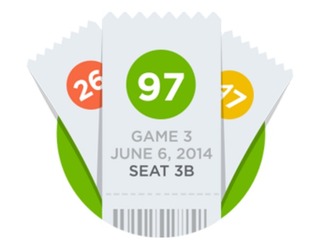How does Course Hero make money?
The company offers a freemium model, where users can pay to access more content and ask questions
Read more...
Updated to reflect new information on advertising revenue
Secondary ticket markets, like StubHub and ScoreBig, have risen up in response to the ridiculous surcharges from TicketMaster. The problem is, though, that people sell those tickets for even higher markups. And since there are so many of them now, it's almost impossible to know if you are getting the best deal on your seats.
Ticket search engine SeatGeek is the solution to that problem. It acts like a Kayak for tickets, with a search engine that looks for tickets all over the Web, showing users which site has the best price. Sadly, that may mean still paying those TicketMaster upcharges, but at least you won't get hosed by upsellers.
The company makes its money from two revenue sources.
When someone comes to the site and clicks to buy a ticket, they are redirected to the corresponding partner site. If they complete the order, and buy a ticket, SeatGeek gets a percentage of that sale paid to it from the partner site at no additional cost to the ticketbuyer.
SeatGeek doesn't say what that percentage is, but others have pegged it at roughly 10 percent of the ticket price.
In November, SeatGeek announced a new marketplace, which allows ticketholders to list, sell and transfer tickets directly to other fans, making it a competitor with the sites it is aggregating from, most notably StubHub.
Listing tickets on SeatGeek is completely free. When a ticket is successfully sold, SeatGeek takes a 15 percent fee off of the purchase price.
Update
"The primary reason is because we, and our users, really value the simplicity inherent in our design. We came to the conclusion that putting ads on the site detracted from that simplicity so we decided to cease advertising," a spokesperson for SeatGeek told me.
Founded in 2009, SeatGeek has raised $103 million in funding from Technology Crossover Ventures, Founder Collective, Causeway Media Partners, Mousse Partners, Carmelo Anthony, Shane Battier, Peyton Manning, Eli Manning and Nas.
(Image source: seatgeek.com)
The company offers a freemium model, where users can pay to access more content and ask questions
Read more...The company sells a premium version of its free product to parents, schools and districts
Read more...Initially a platform for renting textbooks, it now makes 90% of revenue from software subscriptiions
Read more...Startup/Business
Joined Vator on
SeatGeek forecasts the price of sports and concert ticket on the secondary market, analogous to what Farecast (now Bing Travel) does for airline tickets. For ticket buyers this helps determine whether to buy a ticket immediately or wait for a price drop. For sellers it helps identify the optimal time to unload their tickets.
SeatGeek’s crawlers have compiled millions of ticket transactions and have also aggregated other factors that influence prices. SeatGeek's patent-pending technology uses this data to accurately predict prices.
SeatGeek offers a free version for buyers and will soon release a premium version for brokers and other sellers.




